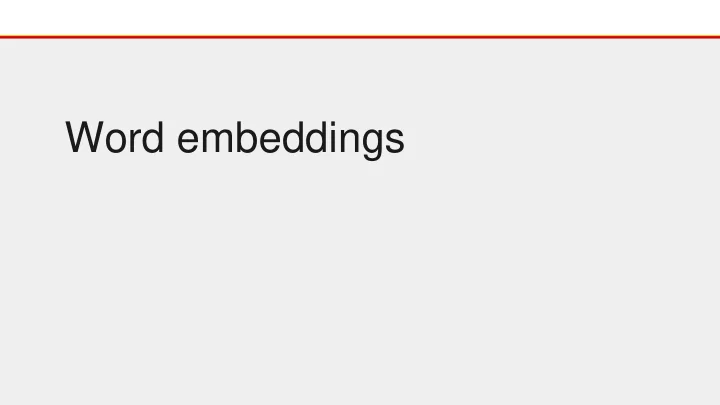

Word embeddings
Rappel Embeddings ( pas Word Embeddings )
Est une “lookup table” Formalisme: ● Index d’un mot: w i ● Table d’embeddings (lookup matrix): V ● Embedding: e i ● e i = V( w i )
Représentation d’un mot Différentes possibilités: Vecteur One-hot ● ○ Chat : [0,0,… 0, 1 ,0,0,0,0,0,0,0,0,0…] ● Vecteur de context ○ Chat : [ 1 ,0,… 0, 0 ,0,0,0, 1 ,0,0, 1 ,0,0…] félin litière lait chat
Vecteurs de contexte “Chap. 15: Vector Semantics.” Speech and Language Processing: an Introduction to Natural Language Processing, Computational L inguistics, and Speech Recognition, by Dan Jurafsky and James H. Martin, Dorling Kindersley Pvt, Ltd., 2014.
Vecteurs de contexte “Chap. 15: Vector Semantics.” Speech and Language Processing: an Introduction to Natural Language Processing, Computational L inguistics, and Speech Recognition, by Dan Jurafsky and James H. Martin, Dorling Kindersley Pvt, Ltd., 2014.
Vecteurs de contexte “Chap. 15: Vector Semantics.” Speech and Language Processing: an Introduction to Natural Language Processing, Computational L inguistics, and Speech Recognition, by Dan Jurafsky and James H. Martin, Dorling Kindersley Pvt, Ltd., 2014.
Vecteurs de contexte “Chap. 15: Vector Semantics.” Speech and Language Processing: an Introduction to Natural Language Processing, Computational L inguistics, and Speech Recognition, by Dan Jurafsky and James H. Martin, Dorling Kindersley Pvt, Ltd., 2014.
Vecteurs de contexte Vecteurs très grands (taille du vocabulaire) ● Contiennent beaucoup de 0 ● ● On cherche donc une manière de réduire la dimensionnalité pour : ○ Efficacité en mémoire ○ Facile d’utilisation pour des classificateurs Moins de paramètres ○ Des dimensions peuvent se recouper ○
Décomposition en valeurs singulières “Chap. 15: Vector Semantics.” Speech and Language Processing: an Introduction to Natural Language Processing, Computational L inguistics, and Speech Recognition, by Dan Jurafsky and James H. Martin, Dorling Kindersley Pvt, Ltd., 2014.
On conserve les top k valeurs singulières “Chap. 15: Vector Semantics.” Speech and Language Processing: an Introduction to Natural Language Processing, Computational L inguistics, and Speech Recognition, by Dan Jurafsky and James H. Martin, Dorling Kindersley Pvt, Ltd., 2014.
On utilise ensuite seulement la matrice W “Chap. 15: Vector Semantics.” Speech and Language Processing: an Introduction to Natural Language Processing, Computational L inguistics, and Speech Recognition, by Dan Jurafsky and James H. Martin, Dorling Kindersley Pvt, Ltd., 2014.
Méthodes à réseaux de neurones
GloVe “A weighted least squares regression model” L’idée est de prédire le nombre de co -occurrences X ij (ou le log ) des mots w i et w j S’apparente à Word2Vec (ou encore FastText)
GloVe w j w i 25
GloVe Perte = v( w i ) * v( w j ) + b i + b j - log (X ij )
GloVe Perte = v( w i ) * v( w j ) + b i + b j - log (25)
Word2Vec 2 algorithmes: Skip-Gram ● CBOW (Contextual Bag of Words) ●
Word2Vec
CBOW
CBOW
CBOW - Negative Sampling litière chat softmax
CBOW - Negative Sampling café chat litière pomme feuille
CBOW - Negative Sampling score entre un mot w et un context C
CBOW - Comment obtenir un score Produit vectoriel entre v C et v w
CBOW - Comment obtenir un score = <wh, whe, her, ere, re>, <where>
CBOW - Phrase Representations v (New) + v (York) ≈ Boston?
CBOW - Phrase Representations v (New) + v (York) ≈ Issshhh?
CBOW - Phrase Representations New York => New_York
Démo FastText
Recap FastText … le petit chat saute sur ...
Recap FastText le petit saute sur [-2.2, 2.3, 2.4] [-0.2, -1.3, 0.4] [-3.2, 1.3, 0.5] [-3.2, 1.3, 0.5] chat [0.2, 1.3, 3.4] w i c 1 c 2 c 3 c 4 C Negative sampling: score + marteau [1.2, -1.3, -3.4] - n i score
ELMo On le verra dans la section modèles de langue..!
Vecteurs de phrases
Comment obtenir la représentation d’une phrase? Prendre la moyenne des embeddings de mots ● Utiliser une idée similaire à Skip-Gram! ●
Skip-Thought Vectors Idée de base: Étant donné un triplet de phrases ( s i-1 , s i , s i+1 ) ● Encoder la phrase s i ○ ○ Générer les phrases s i-1 et s i+1
Skip-Thought Vectors
Skip-Thought Vectors
Skip-Thought Vectors
Skip-Thought Vectors
Skip-Thought Vectors
Skip-Thought Vectors
Skip-Thought Vectors
Skip-Thought Vectors
Skip-Thought Vectors Modèles de langue
Skip-Thought Vectors Au final, on se sert de ça!
Skip-Thought Vectors Probabilité d’avoir généré la phrase suivante Probabilité d’avoir généré la phrase précédente
Recommend
More recommend